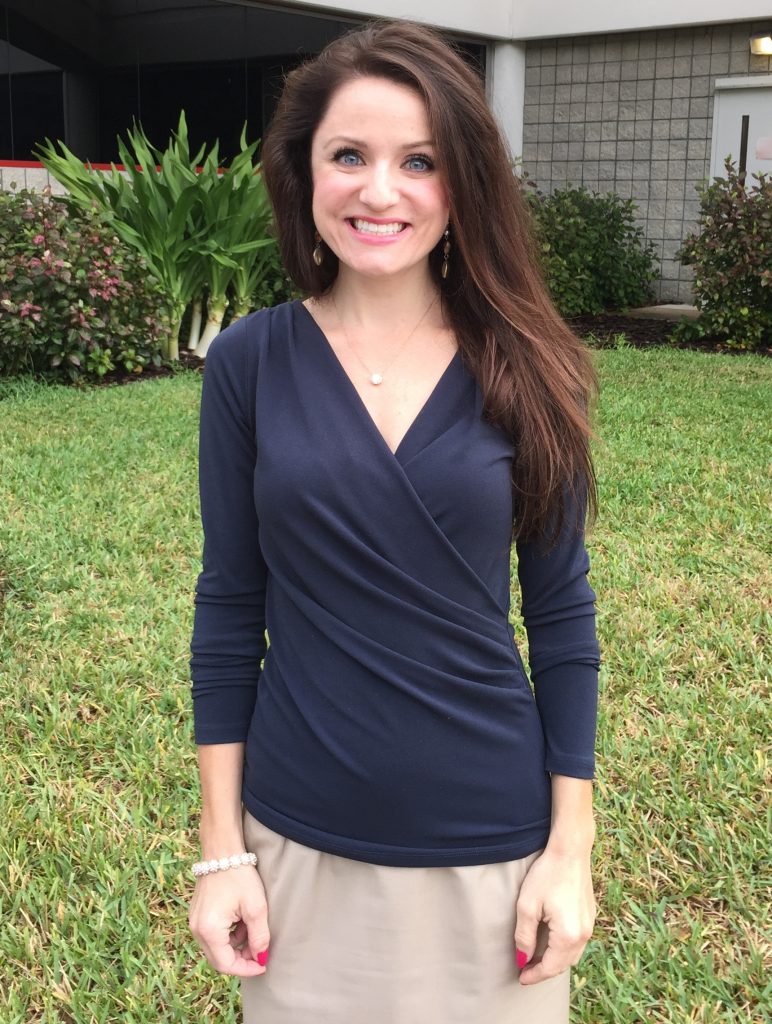Dr. Katherine Drabiak examines ties between cancer and personal hygiene products [MEDIA]
Do you know what each of the ingredients does in your favorite shampoo or lipstick? That’s something USF College of Public Health’s Dr. Katherine Drabiak, attorney and assistant professor of bioethics and genomics says consumers should ask more often.
In “Dying to Be Fresh and Clean? Toxicants in Personal Care Products, the Impact on Cancer Risk, and Epigenetic Damage,” published in Pace Environmental Law Review, she assesses cancer causing toxicants found in everyday personal care products, the impact on cancer risk, and the role of the U.S. Food and Drug Administration (FDA) in regulating ingredients in those products.

(Photo source: Wikimedia Commons)
She used recent lawsuits against Johnson & Johnson over talcum powder and risk of ovarian cancer to look at FDA regulation of consumer products used every day, such as shower gel, shaving cream, baby shampoo, and aftershave.
“Despite public perception that these products are ‘safe,’ the FDA does not review ingredients in these products prior to the public using them,” Drabiak said. “Research has connected a variety of chemicals contained in these products to an increased risk of disease, including cancer.”
In fact, there are currently more than 5,000 lawsuits across the U.S. alleging a link between Johnson & Johnson’s baby powder and cancer risk.
Drabiak, an assistant professor of health policy and management at the COPH, said the FDA does not conduct pre-market review of chemicals contained in cosmetics.
The U.S. legal system for some products is considered what Drabiak calls a “risk-based regulatory system,” which means that manufacturers can put something into the marketplace and see what the potential harm is later.

Katherine Drabiak, author of an article on genetic testing and its impact on cancer treatment, specializes in health law. (Photo by Anna Mayor)
“The company or the manufacturer is telling us it’s safe, but the FDA isn’t looking at all of these hundreds of ingredients that are in these products and interacting in our bodies in different ways,” she said. “This is my call to say there are gaps in the law, but there are things you can do to empower yourself to know that a little bit of health risk is preventable, do what you can to prevent it.”
Drabiak says many cosmetics commonly contain a category of chemicals called endocrine disrupting chemicals which can block or mimic the effects of hormones.
“Things like parabens, which are preservatives, or phthalates which is a plasticizer, are commonly found in things I’m probably using every day, such as hairspray or wrinkle cream,” she said. “But, what scientists are seeing is that when you pile all of these things on they potentially cause changes in the ways that our hormones are working which can sometimes lead to undesirable health effects like cancer.”
Drabiak said consumers can raise their awareness and understand the power they have to reduce their risk of certain diseases such as cancer through online advocacy resources–like the Campaign for Safe Cosmetics or Environmental Working Group–to identify chemicals to avoid and find product alternatives.
“This is not to alarm anybody, it’s to empower people to understand that there are a number of potentially problematic ingredients,” she said. “As a legal measure, my research is looking at how can we potentially change the law and make consumers more aware of what they are using to prevent these types of health risks or decrease them.”
Dying to be fresh and clean?We’re live with Dr. Katherine Drabiak, attorney and assistant professor of bioethics and genomics at the #USF College of Public Health. She authored an article published in Pace Environmental Law Review assessing cancer causing toxicants found in everyday personal care products, the impact on cancer risk, and the role of the FDA in regulating ingredients in those products.#USFCOPHRocks! #BabyPowder #SyntheticIngredients #FDAregulations #EndocrineDisruptingChemicals #Cosmetics #PersonalCareProductsKatherine Drabiak JDUSF Health-University of South FloridaPace Environmental Law Review
Posted by USF College of Public Health on Tuesday, June 5, 2018
View the Facebook Live interview with Dr. Drabiak here.
***
Drabiak, K. (2018). Dying to Be Fresh and Clean? Toxicants in Personal Care Products, the Impact on Cancer Risk, and Epigenetic Damage. Pace Environmental Law Review, 35: 75-107.
Story by Anna Mayor, USF College of Public Health
